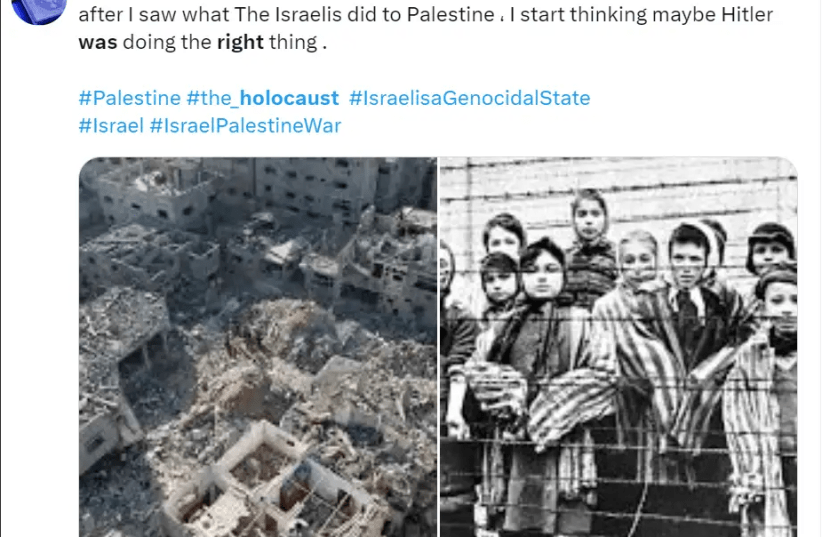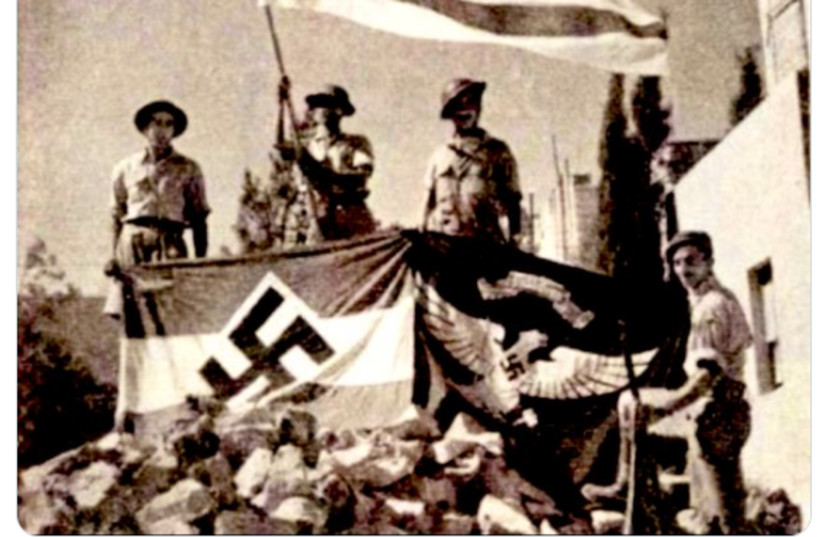Troubling trends are brewing in online discussions surrounding the Holocaust.
This will be highlighted by the Fighting Online Antisemitism (FOA) organization on Tuesday, when it presents its comprehensive annual report to the Knesset Committee for Immigration, Absorption and Diaspora Affairs.
This report, examining antisemitic social media content pertaining to the Holocaust collected by the FOA monitoring team from January 23 to April 7, presents numerous examples underscoring the urgent need for heightened awareness and proactive measures to combat antisemitism in digital spaces.
One of the most concerning aspects highlighted in the report is the growing phenomenon of Holocaust justification. Within the context of the conflict with Hamas in the Gaza Strip, there has been a notable surge in online content attempting to rationalize the Holocaust as a purported response to Israel’s defensive actions.
Such attempts not only distort historical facts but also run afoul of social media community guidelines, specifically falling under the category of “glorification of violence.”
Despite these guidelines, a significant amount of such content continues to persist due to inadequate content moderation on various online platforms. This lack of strict scrutiny allows such content to proliferate and poison public discourse.
Furthermore, the FOA report delves into the insidious practice of drawing parallels between Israeli policies and Nazism, known as Holocaust inversion. This reprehensible tactic not only seeks to malign Israel but also minimizes the magnitude of the atrocities committed during the Holocaust. By equating Israeli defense measures with Nazi actions, this distortion of history not only perpetuates misinformation but also undermines efforts to combat contemporary antisemitism.
The resurgence of Holocaust denial
The scourge of Holocaust denial continues to persist and has shown a troubling resurgence, particularly following recent events. Exploiting tragic circumstances, some individuals and groups seek to delegitimize the historical reality of the Holocaust, claiming it was fabricated by Jews for political gain.
This malicious narrative not only disrespects the memory of millions of Holocaust victims but also fuels dangerous conspiracy theories that can have real-world implications. Antisemitic groups leverage these falsehoods to advocate for the elimination of the Jewish state, further exacerbating tensions and sowing discord.
In addition to these distressing trends, the FOA report addresses the emergence of the “Gaza Holocaust” narrative in media outlets across the Arab world. This troubling rhetoric, likening Israeli defensive measures in Gaza to the Holocaust, not only distorts historical truths but perpetuates harmful stereotypes and fosters a climate of hostility. Such comparisons trivialize the immense suffering of Holocaust victims and survivors, detracting from genuine efforts toward regional peace and understanding.
The report serves as a stark reminder of the ongoing challenges posed by online antisemitism and the imperative for collective action. Policy-makers, online platforms, civil society organizations, and individuals must work collaboratively to combat hate speech, enforce community guidelines rigorously, and promote factual education about the Holocaust and its enduring lessons.
By fostering a culture of tolerance, empathy, and mutual respect, we can strive toward a future free from the scourge of antisemitism and all forms of hatred and discrimination.
IN THE wake of the tragic events surrounding Oct. 7, social media platforms have witnessed a concerning surge in content drawing parallels between Israel and Nazi Germany.
Such comparisons, often laden with antisemitic undertones, not only trivialize the atrocities of the Holocaust but also perpetuate harmful stereotypes and narratives.
The use of inflammatory language and imagery to equate the actions of the Israeli government or military with those of the Nazi regime is deeply offensive and undermines efforts to promote understanding and peace in the region.
This trend underscores the urgent need for heightened vigilance and proactive measures to counter antisemitism and hate speech on digital platforms.
Holocaust imagery is deliberately exploited to fuel hate speech. Those who harbor animosity toward Jews recognize that evoking the trauma of the Holocaust can intensify the impact of hateful content and incite further hostility toward Jewish people.
Curtailing online antisemitism is not just a matter of policy; it’s a moral imperative. In a digital age where information spreads rapidly, we must be vigilant in combating hate speech and misinformation.
Every effort to counter online antisemitism is a step toward preserving the dignity and rights of all individuals, regardless of their backgrounds or beliefs.
The writer is CEO of Fighting Online Antisemitism.

